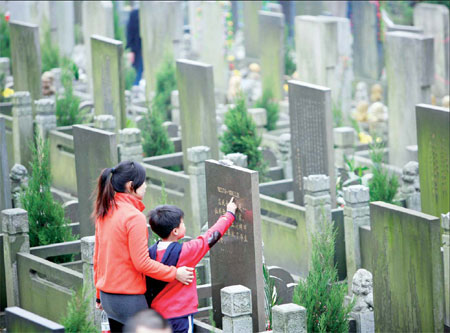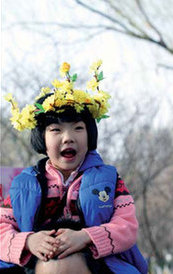Dead heat
Updated: 2013-03-29 08:33
By Yang Yang (China Daily)
|
|||||||||||

|
Top and above: Mourning at ancestors' tombs on Qingming; a girl on a spring outing on the day of the festival. Provided to China Daily |
Qingming has a new look with the tradition of burning paper money for ancestors to use in the afterlife replaced by paper replicas of cell phones, cars and even mistresses
Cell phones, computers, houses and cars, all made of paper, will go up in flames across China on April 4, known as Tomb Sweeping Day or Qingming.
All over the country, people will go to the graves of their ancestors and light up these paper offerings to the dead, the idea being that they become real objects in the afterlife.
Qingming, which means clear and bright, is the 15th day after the spring equinox. Suppressed during the "cultural revolution"(1966-76) and reinstated as a public holiday in 2008, the festival has been thoroughly modernized by the Chinese public, with the tradition of burning fake money now replaced in many instances with paper replicas of the trappings of modern life, including everything from make-up sets to brassieres and even mistresses.
It is a far cry from the origins of the day or how it was until fairly recently marked, with a quiet prayer and the burning of some paper notes. And it is a change that has proved unpopular with many traditionalists.
"Although people also show their respect to their ancestors by burning luxury goods, villas or mistresses made of paper, I don't think it is proper," says Xiao Fang, director of the Institute of Folklore and Social Development at the College of Liberal Arts, Beijing Normal University.
"People impose their kitsch understanding of enjoyment on their ancestors. It is unnecessary and a waste of paper and resources. If people want to show their love and respect, it is better to do it in a very simple style, like burning spirit money and kowtowing, which are traditional, or talking to them before their tombs."
He believes burning paper replicas of expensive items is simply vanity and a means of showing off wealth.
Though the festival's popularity has been on the rise in recent years, understanding of its origins and meanings appears to be on the wane. In a 2008 poll of primary school students in Guangzhou, 70 percent had little idea of the festival's cultural significance.
"The tradition of Qingming has lasted more than 2,500 years. Its meaning goes far beyond tomb sweeping," says Xiao Fang.
It originally marked one of the 24 Chinese solar terms, which were crucial to agriculture because they told farmers when to sow and when to harvest. Qingming meant the weather was becoming warmer and it was time to plow and plant.
In the seventh century BC during what's called the Spring and Autumn Period (770-476BC) of Chinese history, the meaning of Qingming was broadened, according to legend because of a loyal courtier called Jie Zitui, in the state of Jin.
In an effort to avoid assassination, Prince Chong'er of Jin went into exile. Because of the hard life this entailed, he saw the number of his courtiers gradually began to dwindle and one day Chong'er, weak from hunger, blacked out. To save the prince, Jie Zitui, one of the few followers he had left, cut a piece of meat from his own leg, roasted it and fed it to the prince.
Nineteen years later, when the prince had risen to become one of China's most powerful lords, he rewarded his followers, but forgot Jie. When the prince's courtiers reminded him of Jie's sacrifice he sent word for him to come to court, but instead Jie hid on Mianshan Mountain in Shanxi province, with his elderly mother.
After having the mountain searched to no avail, the prince had it set on fire from three sides in the hope of driving Jie and his mother into the open on the fourth. The fire raged for three days but Jie did not appear and when the flames calmed down enough for people to return to the mountain they found the bodies of Jie and his mother holding onto a burnt willow tree. Alongside the bodies was a poem written by Jie in his own blood with advice to the prince on how to rule the state.
The prince took the poem and had the mother and son buried under the burnt willow. The mountain was renamed Jieshan Mountain and an ancestral hall was built on it.
The prince made the day on which the fire was set Hanshi Festival, or Cold Food Festival, and said no food should be cooked that day.
The following year, wearing mourning clothes, the prince took his courtiers up the mountain to Jie's tomb, where he saw the willow tree had come back to life. He snapped a twig from the tree and plaited it into a wreath, which he wore, and after sweeping the tomb renamed the willow the Qingming Willow and declared that day Qingming Festival.
Following Jie's suggestions, the prince managed the state well and his people were happy. In order to remember Jie they would attach willow twigs to their doors, the idea being that this could summon his soul.
In the Qing Dynasty (1644-1911), Hanshi and Qingming were merged into one day, Qingming Festival, when people would eat only cold food, sweep their ancestors' tombs and spend time with family and friends.
"Besides paying respect to our ancestors, Qingming is also a festival of spring," Xiao says.
"It's a time for people to go on outings into the mountains and fields and have close contact with nature; a time to play games with friends and relatives. After a long winter indoors it's a time for people to feel refreshed and vibrant among mother nature."
To keep this aspect of the day alive Chinese schools plan spring outings on the day of the festival.
"For Chinese people, Qingming is an important day that shows their faith in ancestors and tradition," says Xiao. "We don't have Thanksgiving Day, but to some extent, Qingming can be regarded as China's Thanksgiving Day for us to show our gratitude to our forefathers."
yangyangs@chinadaily.com.cn
(China Daily 03/29/2013 page26)
Today's Top News
Police continue manhunt for 2nd bombing suspect
H7N9 flu transmission studied
8% growth predicted for Q2
Nuke reactor gets foreign contract
First couple on Time's list of most influential
'Green' awareness levels drop in Beijing
Palace Museum spruces up
Trading channels 'need to broaden'
Hot Topics
Lunar probe , China growth forecasts, Emission rules get tougher, China seen through 'colored lens', International board,
Editor's Picks

|

|

|

|

|

|






